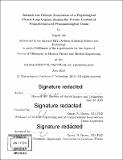Towards the clinical translation of a physiological closed-loop control system for precise control of propofol-induced pharmacological coma
Author(s)
An, Jingzhi,Ph. D.Massachusetts Institute of Technology.
Download1119539280-MIT.pdf (30.98Mb)
Alternative title
Towards the clinical translation of a PCLC system for precise control of propofol-induced pharmacological coma
Other Contributors
Harvard--MIT Program in Health Sciences and Technology.
Advisor
Emery N. Brown.
Terms of use
Metadata
Show full item recordAbstract
Physiological closed-loop control (PCLC) is an emerging technology that can revolutionize the standard-of-care by ensuring timely, precise, and consistent delivery of therapy that is also cost-effective, distraction-free, and non-labor intensive. However, the clinical translation of PCLC systems has been impeded by the lack of real-world performance and safety guarantees, which are difficult to provide due to unique engineering and regulatory challenges, such as uncertain, nonlinear physiological systems and complex healthcare settings. We studied the delivery of propofol-induced pharmacological coma in patients with refractory status epilepticus (RSE) as a prototypical application to address this translational challenge for PCLC systems. To motivate the chosen application, we conducted a retrospective clinical study and showed that the clinical management of pharmacological coma in RSE patients may be improved with PCLC. We then made contributions in five areas to enhance the performance and safety of a PCLC system for delivering propofol-induced pharmacological coma. First, we built the PCLC system with explicit considerations of usability issues and regulatory requirements for preclinical evidence of safety. Second, we built a hardware-in-the-loop platform to evaluate the PCLC system under conditions mimicking real-world operation. Third, we devised new experimental methods to characterize the performance of clinical infusion pumps for PCLC applications, and performed experiments to characterize several commercially-available infusion pumps. Fourth, we systematically analyzed pharmacokinetic-pharmacodynamic models to better understand physiological response to propofol. Finally, we proposed a flexible chance-constrained stochastic optimal control framework for designing controllers with explicit performance and safety guarantees under real-world uncertainties for PCLC systems. Overall, we have taken concrete steps towards clinical translation of a PCLC system for precise control of propofol-induced pharmacological coma, and the methods developed can be applied to other PCLC systems.
Description
Thesis: Ph. D. in Medical Physics and Medical Engineering, Harvard-MIT Program in Health Sciences and Technology, 2019 Cataloged from PDF version of thesis. Includes bibliographical references (pages 259-273).
Date issued
2019Department
Harvard--MIT Program in Health Sciences and Technology; Harvard University--MIT Division of Health Sciences and TechnologyPublisher
Massachusetts Institute of Technology
Keywords
Harvard--MIT Program in Health Sciences and Technology.